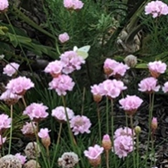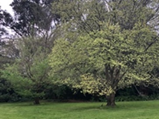Rotary has a keen interest in helping the community be more sustainable and efficient in its energy and water use
Importance of Trees and Gardens
Trees
- Tree planting by sequestering carbon dioxide from the atmosphere reduces carbon emissions which improves the health of our planet.
- A tree can absorb as much as 48 pounds of carbon dioxide per year and can sequester 1 tonne of CO2 by the time it reaches 40 years.
- For every 15 trees planted, 1 tonne of carbon is taken from the atmosphere.
- Whether surrounded by bushland, or in a built-up urban environment, planting trees improves the quality of land, and creates a flourishing habitat that attracts native wildlife.
- Trees help cleanse our water systems, prevent soil erosion and combat salinity in the soil.
- Planted in areas that help block the sun, trees are incredibly efficient in keeping living spaces cooler.
- Trees help to reduce noise pollution by absorbing sound.

- A community effort that involves a tree planting on degraded land can be a great way of harnessing resources, and bringing people together, while improving the habitat and biodiversity in their area.
Gardens
- Plants are considered a critical resource because of the many ways that they support life on Earth.
- They release oxygen into the atmosphere and absorb carbon dioxide. The result is cleaner air that is exactly what we need to survive.
- Scientific evidence proves that the colour and beauty in gardens, connects with nature and creates a biodiversity that has enormous personal health and wellbeing benefits - a real positive in this challenging time of the global pandemic.
- Plants encourage insects, butterflies, birds, bees and other pollinators, essential in the reproduction of plant life.
- Plants can be grown in front or back gardens, on balconies, rooftops or pots and in community reserves.
- The roots of plants help bind soil together thus preventing soil erosion.
- Plants help to filter chemicals and bacteria from the water in the ground and water regulation is improved as about 10% of the moisture in the atmosphere is released by plants.

- In planning and preparing for a healthy garden it’s recommended to use fully composted yard waste, apply the correct fertiliser, water properly and choose appropriate sites to plant.
- Growing food for your family decreases the pollution that is put into the atmosphere, by reducing the amount of fruit and vegetables that need to be transported and delivered to stores and markets.
What is Biodiversity?
Biodiversity is the amount of variety of life on Earth. It is the number of different species of plants, animals, and microorganisms. Biodiversity supports a larger number of plant species and, therefore, a greater variety of crops providing a crucial role in food nutrition as well as protecting freshwater resources.
